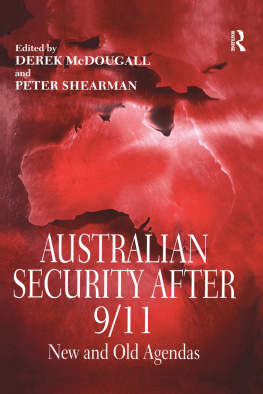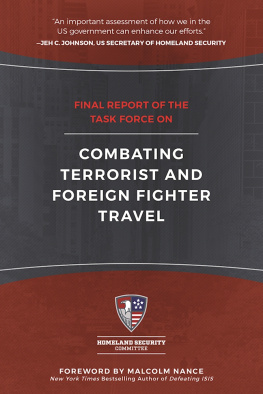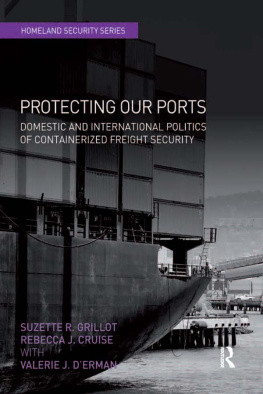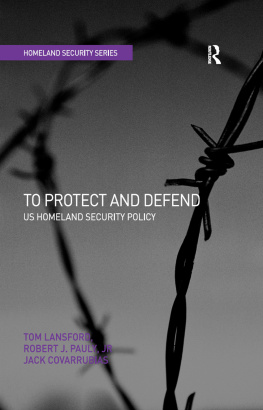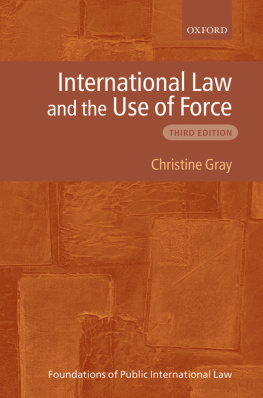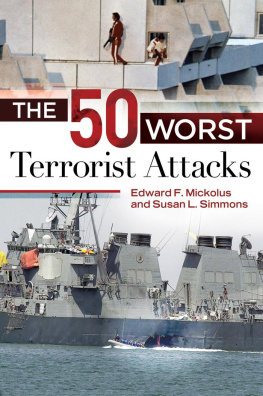AUSTRALIAN SECURITY AFTER 9/11
Australian Security After 9/11
New and Old Agendas
Edited by
DEREK McDOUGALL
University of Melbourne, Australia
and
PETER SHEARMAN
University of Melbourne, Australia
First published 2006 by Ashgate Publishing
Published 2017 by Routledge
2 Park Square, Milton Park, Abingdon, Oxon, OX14 4RN
711 Third Avenue, New York, NY 10017, USA
Routledge is an imprint of the Taylor & Francis Group, an informa business
Copyright Derek McDougall and Peter Shearman 2006
Derek McDougall and Peter Shearman have asserted their right under the Copyright, Designs and Patents Act, 1988, to be identified as the editors of this work.
All rights reserved. No part of this book may be reprinted or reproduced or utilised in any form or by any electronic, mechanical, or other means, now known or hereafter invented, including photocopying and recording, or in any information storage or retrieval system, without permission in writing from the publishers.
Notice:
Product or corporate names may be trademarks or registered trademarks, and are used only for identification and explanation without intent to infringe.
British Library Cataloguing in Publication Data
Australian security after 9/11 : new and old agendas
1.National security - Australia 2.Australia - Foreign relations 1945-
I.McDougall, Derek, 1945- II.Shearman, Peter, 1950-
353.1'0994'090511
Library of Congress Cataloguing-in-Publication Data
Australian security after 9/11 : new and old agendas / edited by Derek McDougall and Peter Shearman.
p. cm.
Includes index.
ISBN 0-7546-4515-0
1. National security--Australia. 2. Australia-Military policy. 3. Australia-Defenses. 4. AustraliaForeign relations--21st century. I. McDougall, Derek, 1945-II. Shearman, Peter, 1950-
UA870.A898 2005
355'.033094--dc22
2005022768
ISBN 13: 978-0-7546-4515-3 (hbk)
Contents
Gareth Evans
Hugh White
Michael Cox
Peter Shearman
Nick Bisley
William Tow
Derek McDougall
Richard Leaver
Richard Chauvel
Robert Ayson
John Henderson
James Walter
Robert Ayson is a Fellow and Director of Studies, Graduate Studies in Strategy and Defence, Strategic and Defence Studies Centre, Research School of Pacific and Asian Studies, Australian National University.
Nick Bisley is a Lecturer in International Relations, School of International and Political Studies, Deakin University.
Richard Chauvel is an Associate Professor in the School of Social Sciences, and Director of the Australia Asia Pacific Institute, Victoria University, Melbourne.
Michael Cox is a Professor in the Department of International Relations, London School of Economics and Political Science.
Gareth Evans is President and Chief Executive of the International Crisis Group, and was Foreign Minister of Australia (1988-96).
John Henderson is an Associate Professor in the Department of Political Science and Communication, University of Canterbury.
Richard Leaver is a Reader in International Relations and Associate Professor, School of Political and International Studies, Flinders University of South Australia.
Derek McDougall is an Associate Professor in the Department of Political Science, University of Melbourne.
Peter Shearman is an Associate Professor in the Department of Political Science, and a Principal Fellow in the Contemporary Europe Research Centre, University of Melbourne.
William Tow is a Professor in the Department of International Relations, Research School of Pacific and Asian Studies, Australian National University.
James Walter is Professor of Political Science in the School of Political and Social Inquiry, Monash University.
Hugh White is Professor of Strategic Studies and Head of the Strategic and Defence Studies Centre, Research School of Pacific and Asian Studies, Australian National University; Visiting Fellow, Lowy Institute of International Policy.
Taken together, the chapters in this book provide a comprehensive assessment of the global, regional, and domestic factors that help us to understand the security dilemmas facing Australia in the post-9/11 environment. During the long Cold War, in the second half of the twentieth century, there was little controversy about Australias priorities in the fields of foreign and security policies, for effectively it was the bipolar superpower conflict that determined alliance partners and strategic thinking. It is the responsibility of all governments to think strategically, with the critical task being to identify national interests and any threats that could undermine them. Once interests and potential threats are clearly identified then these will help drive foreign policy and military strategy.terrorism. These priorities differ markedly from those of the Cold War period and the period before 9/11.
Yet Australias core national interests have not changed fundamentally since the end of the Cold War and the terrorist attacks of 9/11 and the Bali bombings. These interests remain: to prevent an attack on the homeland, to maintain regional and international stability and prevent international conflict, and to ensure the smooth and healthy working of the international economy and the global trade system. What has changed (in perceptions at least) is the nature of the threats to these core interests. Old security agendas and strategic thinking focused upon the threat from great powers, the former Soviet Union and China in particular, and the linked potential threat of the spread of communism, and how this could undermine regional stability. New threats to these core interests come from transnational terrorism, weak, rogue, or failing states, international crime and corruption, and the spread of weapons of mass destruction to both non-state actors and rogue regimes.
For an excellent treatment of strategic thinking see Robert J. Art, A Grand Strategy for America (Ithaca, NY, 2003).
During the United States provided the core alliance partnership for Australia. ANZUS served as a Cold War instrument to counter and deter the Soviet communist threat.
Yet traditional notions of deterrence and containment are thought to be inappropriate strategic policies to pursue to counter the new threats (although it should be noted there are many who would argue that it is possible to employ them). The new breed of terrorism cannot be deterred by threats of retaliatory and escalatory responses to aggression. Indeed, often it would appear that such military retaliation is exactly what the initial aggression is designed to provoke, in the pursuit of creating a wider global war on the West. It is not possible ethically or politically to negotiate with terrorists or organized criminal cartels; there is no likelihood of establishing detente or arms control negotiations with such adversaries. Such threats cannot be contained in a similar way to how the Soviet Union was contained during the Cold War (through countervailing military power, alliance systems, and forward presence). To counter these new non-conventional threats to Australias national security the Australian government has supported US-led wars in Afghanistan and Iraq, legitimating these under the broader rubric of being part of a global war on terror. Specific justification for going to war against Iraq was made on the basis of suspected weapons of mass destruction being secretly developed by Saddam Hussein. The fear was that such weapons, in the hands of an unpredictable dictator with scores to settle, could pass them on to terrorists.

